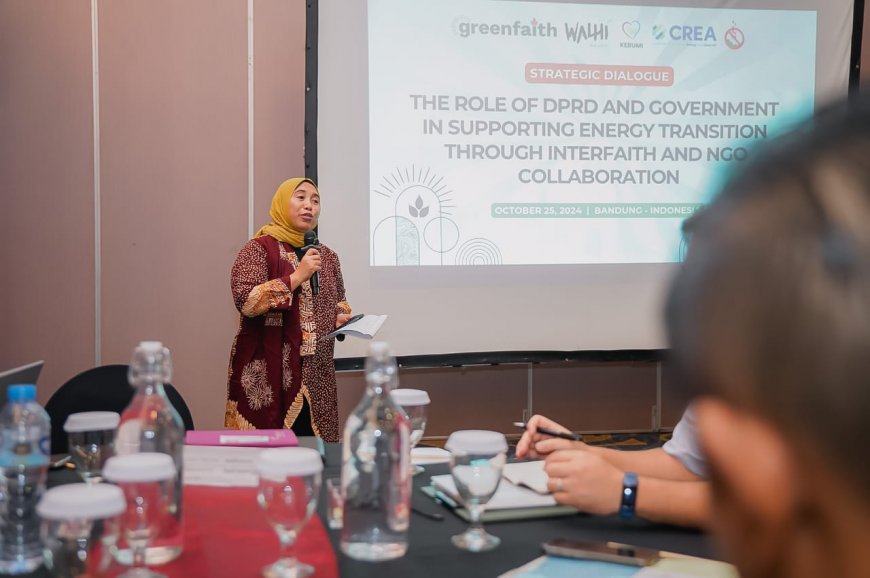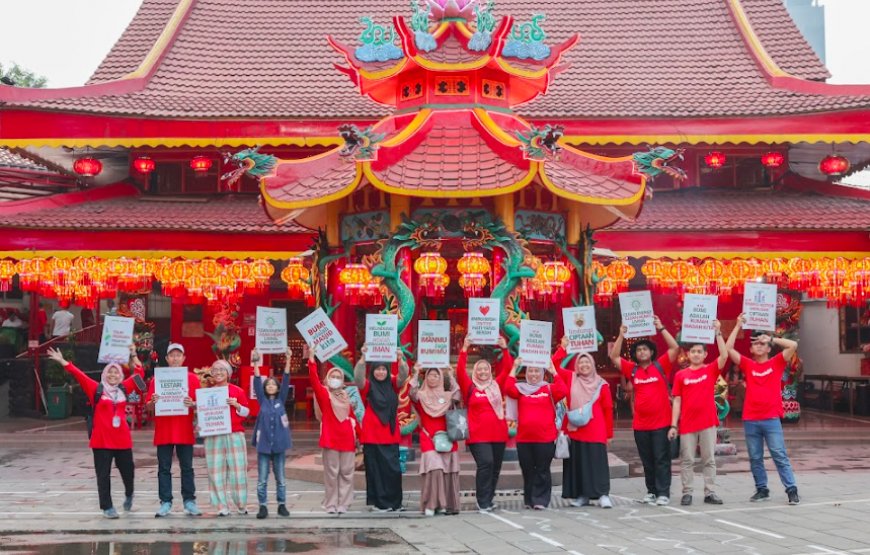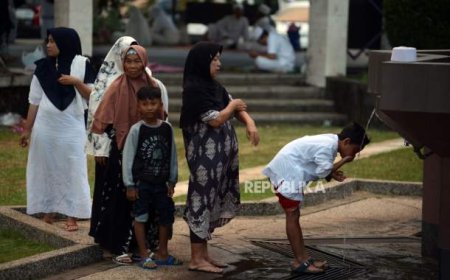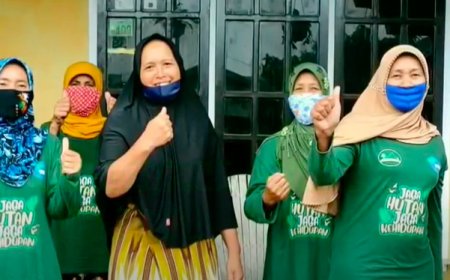Religious and indigenous figures urge revocation of mining permits on small islands
Mining on small islands is considered to accelerate ecosystems and aggravate the climate crisis.

MOSAIC-INDONESIA.COM, JAKARTA — Green Faith Indonesia together with religious leaders and indigenous communities called for the revocation of mining business licenses (IUP) across small islands in Indonesia. This call was in response to the revocation of four IUPs in Raja Ampat by the Minister of Investment/Head of BKPM, Bahlil Lahadalia, who judged that it was not enough to save the earth from the continuing damage.
Director of Green Faith Indonesia, Hening Parlan, stated that mining on small islands accelerates the destruction of ecosystems and aggravates the climate crisis. “As an island nation, we have a spiritual and constitutional mandate to safeguard more than 10,000 small islands. The Qur'an affirms, “Do not cause damage to the face of the earth after (Allah) has repaired it” (QS. Al-A'raf: 56). Therefore, revoking all destructive IUP is a form of obedience to God,” she stressed
Mining on the small island also violates Law No. 27 of 2007, in particular Articles 35 and 73. “The government must not stop at Raja Ampat. Love of the motherland means protecting entire small islands from the voracious exploitation,” she added.
Green Faith Indonesia highlights that the energy transition, claimed to be environmentally friendly, presents a new disaster. Nickel mines for the electric car industry instead add to the misery of the people and the ravages of nature. Forest Watch Indonesia data says 5,700 hectares of forest have been lost in North Maluku since 2021.
A Nexus Foundation study (July 2024) found dangerous heavy metals—mercury and arsenic—in the bodies of fish and blood of Vedic Gulf residents. Even the level of heavy metals in the body of citizens is higher than that of industrial workers. This is a form of ecological injustice.
Photo capture in Raja Ampat area, which is affected by nickel mines. A decapitated iconic tourist paradise that began to be destroyed by greed and government financing. Photo source: Various sources. #RajaAmpat #TambangNikel pic.twitter.com/RdVsxqKeir — Society Review (@SocReviewID) June 4, 2025
The state of health of residents is deteriorating. ISPA cases jumped from 434 (2020) to 10,579 cases in 2023, plus 500 cases of diarrhea per year. “Energy transitions should be aligned with the value of ecological justice, not creating new injustices in the name of progress,” Hening explained.
In Hindu teachings, the concept of Tri Hita Karana emphasizes harmony between man, nature, and God. “What the mine did today breaks that balance. When the great bhuwana (universe) is corrupted, the bhuwana alit (human soul) is also polluted,” Hening said.
The Bishop of Timika, Mgr. Bernardus Bofitwos Baru OSA, expressed deep sorrow for the environmental damage in Raja Ampat during his Pentecost Day Mass sermon on June 8, 2025 at the Tiga Raja Cathedral Church, Timika, Central Papua. “My feelings were torn apart. Raja Ampat, who has been glorified as a masterpiece of God's creation, is now being harmed by human gluttony,” he said. He denounced nickel mining activity as a form of violence against Papuan nature and society, and called it part of “oligarchic greed” that destroyed harmony between man and God's creation.
Pdt. Prof. Binsar Pakpahan, Ph.D., Professor of Jakarta Theological Philosophy High School (STFT Jakarta) calls the blind exploitation of natural resources the fruit of structural greed contrary to God's will. “The life of ugahari movement—living enough and simple—must reach out to the corporate world and policymakers. It is not enough just to preach in the pulpit of the church, but also to voice opposition to a system that normalizes the destruction of the environment,” he stressed. He reminded us that nature is a type of God to be nurtured, not plundered in the name of economic growth. “God created this earth as a common home, not as a field of exploitation. When greed takes over the conscience, the faithful are obliged to stand up for creation,” he concluded.
Of the Muslim representatives, Roy Murtadho, caretaker of Misykat Al-Anwar Ecological Boarding School Lodge expressed his pain to see many leaders who do not reflect views that do not side with society and the environment. “It should be that leaders of this country are fighting to protect the ecosystem, not precisely defend the interests of mines, because this shows an ethical dilemma that shows that there is a gap of understanding between economic interests and environmental protection. Negative impacts include habitat destruction, pollution, and water quality degradation, which have long-term consequences for the environment and generation,” Roy said.

Romo Ferry Sutrisna Widjaja Catholic priest who works at Eco Camp Bandung run by the Interfaith Environmental Friends Foundation remembered Pope Francis in Laudato Si who asked what kind of world will we leave for our posterity to come? Can our hearts still listen to the shrieks of ravaged nature and the screams of local communities harmed by extractive mining exploitation particularly on small, irresponsible islands? Deep questions from Romo Ferry, related to mining on small islands.
Putu Ardana, Adat Dalem Tamblingan also shared his empathy and concern. Reflecting from its very old companion indigenous people called Dalem Tamblingan Indigenous Peoples (MADT) where they have the Ugrasena Inscription dated 922 AD in the inscription believes that the indigenous people's faith is also unique called “Piagem Gama Tirta”, a faith that glorifies water and maintains harmony with nature. Location — Mountainous locations and Indigenous Peoples in various areas of the homeland including in Raja Ampat must have had local wisdom in safeguarding the earth and then being damaged due to industry.
While Upasaka Titha Sukho of the Buddhist Religious Generation Concern Group said that to destroy the forest where creatures live is to defy the Dhamma and plant the seeds of suffering or bad karma, because damaging the forest is like destroying dwellings, foraging places for life. In Buddhism it is clear that man forbids damaging forests or nature because it violates moral rules and inflicts suffering either on oneself or all beings as in Jataka 247 (tittira jataka) of Buddha which explains that we must protect existing animals and nature for the survival of life and without causing new suffering.
In its statement, Green Faith Indonesia urged the government and all policy stakeholders to stop all destructive mining activities on small islands as a form of moral, spiritual and constitutional responsibility. This call is not just the voice of civil society, but the voice of cross-religious faith that protects God's creation.
“For the sake of intergenerational justice, the dignity of indigenous peoples, and our loyalty to the sacred teachings of every religion, we call for: Repeal the entire IUP that damages the small island. Protect the earth, respect the faith, and restore the future,” Green Faith Indonesia said
.







